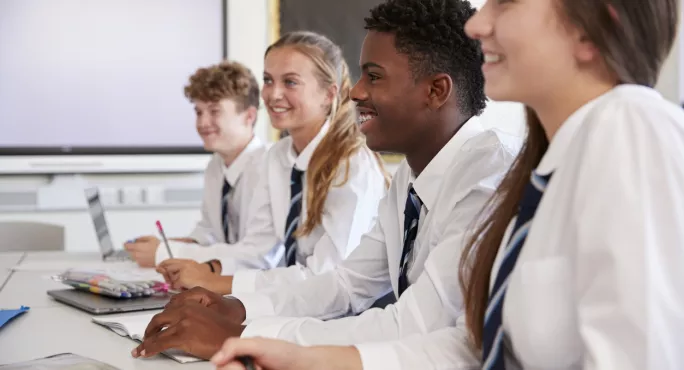Covid: Two-thirds of poorer pupils ‘have fallen behind’

Two-thirds of disadvantaged children are believed to have fallen behind in their education during the Covid pandemic, according to a survey of more than 650 frontline workers.
A growing mental health crisis among children must be addressed if the education gap is to be closed, Buttle UK has warned.
The charity, which provides grants to children and young people in crisis, said that, on average, 10 per cent more children were estimated by professionals to be experiencing mental health problems compared with 2020.
Research: UK pupils lost a third of learning time during pandemic
Ex-recovery tsar: Covid catch-up effort ‘a bit feeble’
Learning loss: £10m for ‘catch-up’ maths mastery and phonics schemes
It also said that more children are now experiencing difficulties in their relationships with their parents, siblings and school peers.
The charity surveyed 669 UK-wide frontline workers from social services, education, housing and health agencies, who support around 36,000 children, between 22 June and 15 July.
The most common problems experienced among the children they were working with were mental illness in the family, domestic abuse and parental separation.
Covid: ‘Urgent’ need for mental health support in schools
All common adverse experiences had been worsened by the pandemic, the charity said, due to a lack of support from family and friends, reduced school monitoring, less exercise, poorer diets and increased isolation.
The charity estimated that, on average, 61 per cent of children that the respondents worked with were experiencing mental health problems - up from 51 per cent in 2020.
Almost three-quarters (73 per cent) of those surveyed said they had seen children struggling with peer relationships since going back to school, while 91 per cent had seen youngsters struggling with overcoming trauma.
On average, the professionals said half of children struggled to engage with education and two-thirds had fallen behind on their education, due to a lack of digital access and challenges in overcoming trauma bought on by the pandemic.
Frontline workers reported that 10 per cent more families were struggling to afford the internet, and 19 per cent more were struggling to afford IT equipment, compared with 2020.
Almost half of the frontline workers said that the most important form of assistance will be mental health support, while just 9 per cent said educational support was the most important.
The Buttle UK report concludes: “These issues - along with their lack of digital access - are seen by support workers as the main drivers for children falling further behind in their education compared to their more affluent peers.
“These frontline professionals overwhelmingly believe that the most urgent issue for such children is to address their mental health issues.
“If we are to close the education gap, we must listen to these professionals and consider how this support can form part of the national recovery plans from the crisis.”
Buttle UK has helped nearly 9,000 children and young people since the start of the pandemic, providing £6.8 million in grants to help families with essentials such as clothes, beds and IT equipment.
It said application rates were 68 per cent higher in 2020-21 than in the previous year.
Chief executive Joseph Howes warned that educational catch-up programmes will push the mainstream forward and leave vulnerable children behind if their traumatic experiences are overlooked.
He said: “The government’s response to a year of disrupted schooling seems to have been created with children’s stability in the home as a given, and that all is needed is more time to catch up on what was previously lost academically.
“This is simply the worst way of looking at it for the most vulnerable children, who will need a different kind of support to get back to the starting line.
“These children have faced traumatic episodes compounded by the events of the last 18 months. If the assumption is that they can put all of that aside, and just focus on academic achievement, it’s asking for the impossible.”
A government spokesperson said: “We know the past year has been incredibly difficult for many children and young people, who have faced additional challenges and anxieties.
“We are prioritising the wellbeing of children and young people, backed by more than £17 million to build on the mental health support currently available in schools. This includes our £15 million Wellbeing for Education Recovery and Return programmes, which are helping education staff respond to pressures by providing training and resources to staff so that they can support students experiencing trauma, anxiety or grief.
“We are also investing £3 billion to boost learning, including £950 million in additional funding for schools which they can use as they see best to support their pupils, including for mental health and wellbeing.”
Paul Whiteman, general secretary of school leaders’ union the NAHT, said: “The prime minister’s promise that no child would be left behind due to learning lost during the pandemic now needs to be delivered.
“Schools will need a radically more ambitious package of investment from the Treasury in order to get the job done.”
You need a Tes subscription to read this article
Subscribe now to read this article and get other subscriber-only content:
- Unlimited access to all Tes magazine content
- Exclusive subscriber-only stories
- Award-winning email newsletters
Already a subscriber? Log in
You need a subscription to read this article
Subscribe now to read this article and get other subscriber-only content, including:
- Unlimited access to all Tes magazine content
- Exclusive subscriber-only stories
- Award-winning email newsletters
topics in this article



